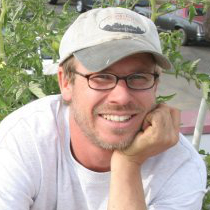This will be a two part reflection on the recent Energy Bulletin skirmish between Rob Hopkins and John Michael Greer. In part 1, submitted here, I offer what is likely a fairly pedestrian response to their volleys. Like many others, I don’t think the differences between the two rise to the level of the rhetoric they have begun to employ. I believe that this sort of argument may be inevitable and perhaps even valuable. But I also believe that these defensive and argumentative postures demand of us a moment of reflection.
Perhaps more signifincantly, I do think this disagreement does uncover an interesting philosophical, even spiritual issue that could be significant to those engaged in planning or preparing for a post carbon future. Only this issue isn’t the one that they are actually discussing, but is instead unearthed as they kick a little dirt at each other. It is an issue that receives little attention in Peak Oil literature. In Part 2, I will share some observations about this issue.
Part 1:
There are days on which I want to join together with my transition friends to laugh, plan, celebrate, and mourn. On other days, it seems that while the laughing, celebrating, and mourning are worthwhile, the planning is a pointless distraction at these events, and that as far as preparing for the future I need to hunker down with my wife and secure the homestead. On such days Greer’s “Green Wizard” project becomes attractive and provides valuable sustenance. On yet other days, I simply want to crank up the A/C, crawl under the covers, take an extra zoloft, watch cable TV, and wish that I could experience the peace of economic security before it disappears for ever.
Although I am highly committed to The Transition Movement and for a variety of reasons Transition Milwaukee is where I am currently putting my efforts, I appreciate Greer’s point that we need to diversify our responses to an uncertain future. Just as I need different things on different days, different people will tend towards a different approach to the long emergency—which, uncertain as the direction it might take is, will be best addressed if we have a wide variety of tools in our chest. I think that if not presented as a direct criticism of Transition, Hopkins would agree. Transition, as I understand it is open to precisely the sort of experimentation that Greer advocates and it certainly provides a big enough tent to cover those who would prefer a more solitary approach, or who are skeptical that the dominant Transition narrative (yes, there is one) will come to pass, even as they endeavor to work primarily in that direction or just hope that parts of it might come to pass.
Despite Transition’s ecumenical and horizontal organizational philosophy, like all movements it risks becoming self-protective, of putting excessive energy into maintaining the movement, qua movement, and thus losing sight of its goals and values. I imagine this risk may face Greer’s merry band of green wizards some day. This risk has nothing to do with the particular individuals who inhabit these organizations, but seems to be endemic to grassroots movements, non-profit organizations, and over-reaching empires alike. And I for one think it will be of great value to the Transition Movement to have little green wizards popping their heads from beneath their bridges to keep us on track, or to witness their solitary rituals in forest clearings so that we might be reminded not only of the power of community, but its perils too.
From a distance, then, say for someone just learning about Peak Oil or coming to grips with the likely consequences of global warming, the argument between Greer and Hopkins might seem insignificant. It may also seem insignificant when viewed from a closer angle. Indeed it took me a moment to understand that Hopkins might even take issue with the Green Wizards as defined by Greer: “individuals who are willing to take on the responsibility to learn, practice and thoroughly master a set of unpopular but valuable skills – the skills of the old appropriate technology movement – and share them with their neighbours when the day comes that neighbours are willing to learn.”
Despite its best efforts to engage a broad community, Transition Milwaukee may end up being a collection of green wizards, mastering new skills, preparing for the day when our neighbors come knocking on our doors. The model of a Totnes, which, I imagine benefits from external inputs of globalized London money and cultural capital, is not likely to work for a large urban rust-belt area, especially in the U.S., where globalist money and cultural capital have started to cut their losses and run for financial centers or for charming bedroom communities which, for now, remain within commuting distance. Hopkins would of course agree that each community needs to fashion a particular local response. Are there not places where Green Wizardry will be especially suited?
That being said, I agree with Hopkins that a focus on community will be crucial to our future. Even if the notion that Milwaukee, or even one of its neighborhoods, could actually become a Transition Town, is, for now, mainly fantasy in a city of this size and character, we desperately need an antidote to the individualistic survivalism that is so strong a part of American culture. Regardless of what the future may hold, a renewed sense of community, or even a newly fashioned one, will be of great value. An open and communal orientation may also prevent the peak oil “movement” from becoming a magnet for anti-social personalities or crackpots looking for any comforting fringe, upon which they can hole up, draw the shades, and share oblique signs of a great conspiracy with other similarly disturbed cyber-associates.
So I think the debate between Hopkins and Greer could be valuable, much in the way a heated academic battle between Foucauldian and Derridian poststructuralism seemed so important to me during graduate school. For these debates do help us sharpen our ideas and refine our language, in ways that cannot be performed without intense debate, without, perhaps, occasional acrimony and defensiveness. But just as I was never forced to choose between Foucault and Derrida, fortunately I don’t actually have to choose between Hopkins and Greer. If I did have to, I would feel that much of what drew me to Transition had been lost to organizational identity and pride. One is only forced to make such a choice when a set of ideas or principles gets mistaken for the foundation or orthodoxy of a Movement. Those of us in Transition should take this as a great warning.






